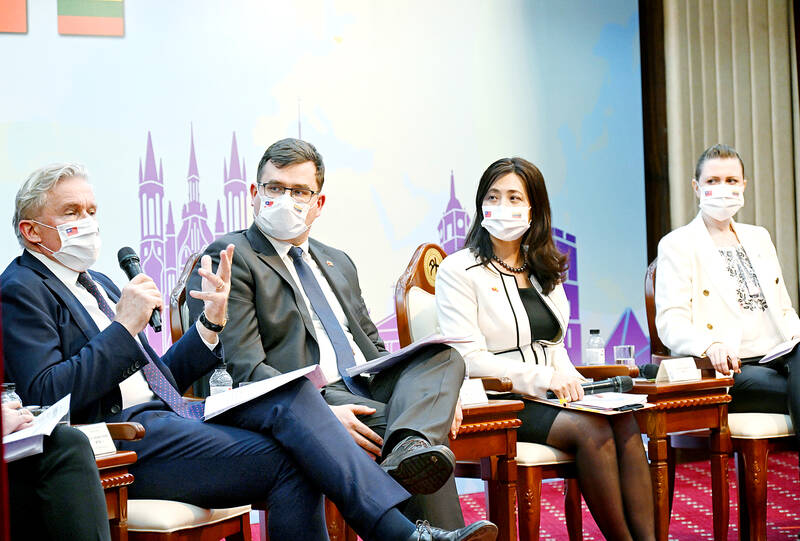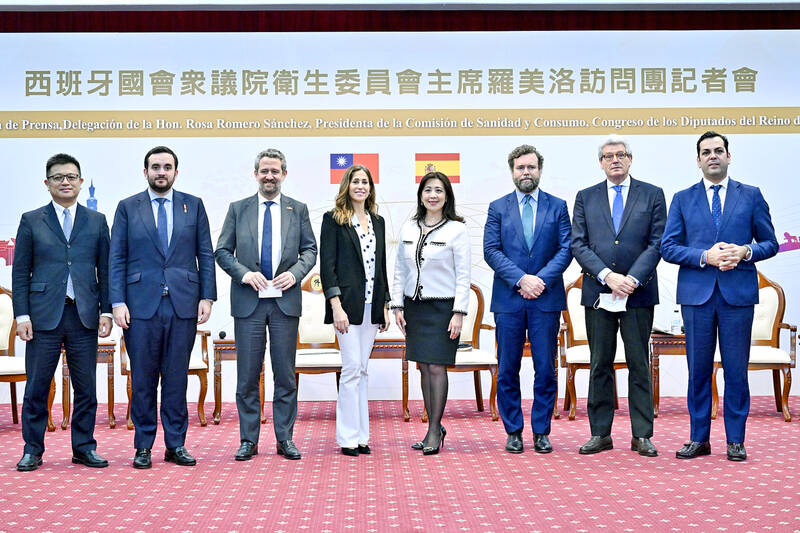Lithuania is expecting more cooperation with Taiwan on defense, security and the economy after fruitful discussions during a visit to the nation, a visiting Lithuanian delegation told a news conference yesterday.
The nine-member parliamentary delegation from the National Security and Defense Committee arrived in Taiwan on Monday for a six-day visit.
Sending a cross-party delegation to Taiwan shows “quite a strong consensus in Lithuania on our relations with Taiwan,” committee head Laurynas Kasciunas told reporters at the Ministry of Foreign Affairs in Taipei.

Photo: Fang Pin-chao, Taipei Times
On her second visit to Taiwan, Dovile Sakaliene, vice chair of the Lithuanian Parliamentary Group for Relations with Taiwan, said that ties between Lithuania and Taiwan are “developing quite quickly and in the right direction.”
Former Lithuanian minister of foreign affairs Audronius Azubalis said that compared with his first visit to Taiwan 25 years ago, “I see tremendous progress in your country.”
The sustainability of relations between the two nations is important in the fields of defense and security, Lithuanian lawmaker Eugenijus Sabutis said.

Photo: Tu Chien-jung, Taipei Times
Lithuania and Taiwan are facing the same problems posed by aggressive neighbors, so have many common issues to share, Lithuanian lawmaker Edita Rudeliene said.
Despite the distance between the two nations, “we are bridged together by common values,” Lithuanian lawmaker Ieva Pakarklyte said.
The main purpose of the visit is to discuss topics related to defense and security, Kasciunas said.
Commenting on Taiwan’s plan to reinstate one year of mandatory military service next year, he said: “It is very, very wise.”
After exchanging ideas and plans with Taiwan, the two sides can foresee cooperation in many areas, including cybersecurity and combating disinformation and propaganda, Sakaliene said.
A group of Lithuanian companies would likely sign a major economic cooperation pact with Taiwanese companies next week, Pakarklyte said.
Speaking of the changes brought by Russia’s invasion of Ukraine, Sakaliene said that Lithuania, Taiwan and Ukraine are “icebreakers in changing the mentality that is old and outdated” to help the world realize that “by withdrawing, we only incite the aggressor to attack,”
“Taiwan’s help to Ukraine also helps Taiwan,” as it provides European nations with more motivation to help Taiwan, she added.
Separately yesterday, Spanish lawmaker Rosa Romero Sanchez said that Spain’s Congress of Deputies opposes any unilateral action to alter the “status quo” in the Taiwan Strait.
Romero Sanchez, president of the Spanish lower house’s Health and Consumer Commission, made the comment at a news conference, adding that China and Taiwan should engage in constructive dialogue.
She said that the Spanish lower house issued a statement on Oct. 6 last year to express its concerns over tensions in the Taiwan Strait.
The Ministry of Foreign Affairs said that it was the first time since the severing of diplomatic relations that a Spanish legislative branch had issued a statement in support of Taiwan.
Romero Sanchez said that she and her delegation are visiting Taiwan to explore opportunities to deepen bilateral ties.
Romero Sanchez arrived in Taiwan on Tuesday for a five-day visit with a delegation that also includes Spanish lawmakers Jaime de Olano, Ricardo Tarno Blanco, Jose Angel Alonso and Juan Diego Requena.
Unlike the German, Lithuanian and Tuvaluan parliamentary groups that have visited Taiwan over the past week, the Spanish delegation was not scheduled to meet with President Tsai Ing-wen (蔡英文) or Premier Su Tseng-chang (蘇貞昌).

INVESTIGATION: The case is the latest instance of a DPP figure being implicated in an espionage network accused of allegedly leaking information to Chinese intelligence Democratic Progressive Party (DPP) member Ho Jen-chieh (何仁傑) was detained and held incommunicado yesterday on suspicion of spying for China during his tenure as assistant to then-minister of foreign affairs Joseph Wu (吳釗燮). The Taipei District Prosecutors’ Office said Ho was implicated during its investigation into alleged spying activities by former Presidential Office consultant Wu Shang-yu (吳尚雨). Prosecutors said there is reason to believe Ho breached the National Security Act (國家安全法) by leaking classified Ministry of Foreign Affairs information to Chinese intelligence. Following interrogation, prosecutors petitioned the Taipei District Court to detain Ho, citing concerns over potential collusion or tampering of evidence. The

Seventy percent of middle and elementary schools now conduct English classes entirely in English, the Ministry of Education said, as it encourages schools nationwide to adopt this practice Minister of Education (MOE) Cheng Ying-yao (鄭英耀) is scheduled to present a report on the government’s bilingual education policy to the Legislative Yuan’s Education and Culture Committee today. The report would outline strategies aimed at expanding access to education, reducing regional disparities and improving talent cultivation. Implementation of bilingual education policies has varied across local governments, occasionally drawing public criticism. For example, some schools have required teachers of non-English subjects to pass English proficiency

‘FORM OF PROTEST’: The German Institute Taipei said it was ‘shocked’ to see Nazi symbolism used in connection with political aims as it condemned the incident Sung Chien-liang (宋建樑), who led efforts to recall Democratic Progressive Party (DPP) Legislator Lee Kun-cheng (李坤城), was released on bail of NT$80,000 yesterday amid an outcry over a Nazi armband he wore to questioning the night before. Sung arrived at the New Taipei City District Prosecutors’ Office for questioning in a recall petition forgery case on Tuesday night wearing a red armband bearing a swastika, carrying a copy of Adolf Hitler’s Mein Kampf and giving a Nazi salute. Sung left the building at 1:15am without the armband and apparently covering the book with a coat. This is a serious international scandal and Chinese

TRADE: The premier pledged safeguards on ‘Made in Taiwan’ labeling, anti-dumping measures and stricter export controls to strengthen its position in trade talks Products labeled “made in Taiwan” must be genuinely made in Taiwan, Premier Cho Jung-tai (卓榮泰) said yesterday, vowing to enforce strict safeguards against “origin laundering” and initiate anti-dumping investigations to prevent China dumping its products in Taiwan. Cho made the remarks in a discussion session with representatives from industries in Kaohsiung. In response to the US government’s recent announcement of “reciprocal” tariffs on its trading partners, President William Lai (賴清德) and Cho last week began a series of consultations with industry leaders nationwide to gather feedback and address concerns. Taiwanese and US officials held a videoconference on Friday evening to discuss the